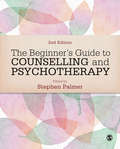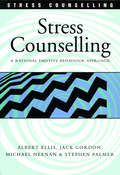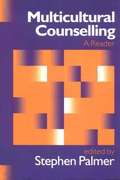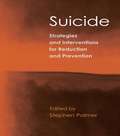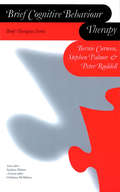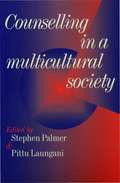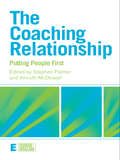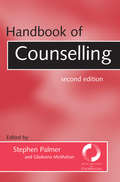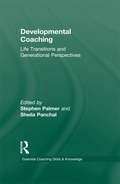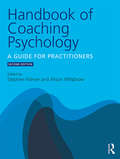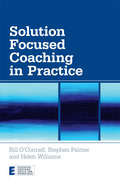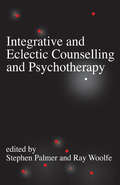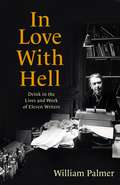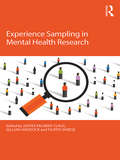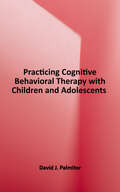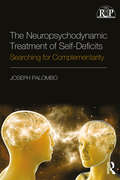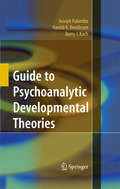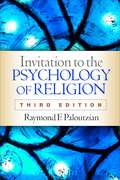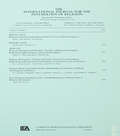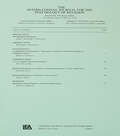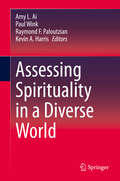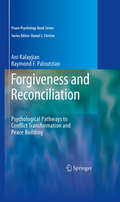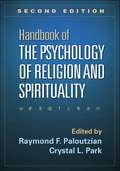- Table View
- List View
The Beginner's Guide to Counselling & Psychotherapy
by Professor Stephen PalmerAre you interested in the field of counselling and psychotherapy or just starting out in your training? Trying to get to grips with the many different approaches and decide which are right for you? This book can help! An ideal introductory text that assumes no prior knowledge, leading authors in the field provide overviews of 26 counselling and psychotherapy approaches in accessible, jargon-free terms. Each approach is discussed using the same framework to enable easy comparison and evaluation, covering: · Development of the Therapy · Theory and Basic Concepts · Practice · Which Clients Benefit Most? · Case study Four further chapters offer an insight into the therapeutic relationship, working with diversity, professional issues, and research, while resources such as suggested reading, discussion issues, appendices of further information and a comprehensive glossary help you consolidate your learning. So look no further if you want to know the differences between counselling and psychotherapy, compare psychodynamic and psychoanalytic theories, discover how constructivist approaches can be applied in practice, learn about third wave CBT therapies, or just get an general overview of the field; this second edition of a bestseller gives you a whirlwind tour of the breadth, complexity, fascination and problems of the field of counselling and psychotherapy.
Stress Counselling: A Rational Emotive Behaviour Approach (Stress Counselling #11)
by Professor Stephen Palmer Mr Michael Neenan Dr Albert Ellis Mr Jack Gordon`The text is clear and easy to follow with vivid sessional excerpts that illustrate the theoretical dialogue' - International Review of Psychiatry `The publication proves to contain much instructive and practice-oriented material' - Nursing Standard Stress Counselling is a comprehensive study of the theory and practice of the Rational Emotive Behaviour approach applied to stress counselling and psychotherapy. Albert Ellis pioneered Rational Emotive Behaviour Therapy (REBT), which has since been adopted internationally. This approach enables the clients to embark on a course of effective counselling which has a clear beginning and end. This book discusses techniques and solutions to common problems and also provides guidance on conducting group work. Its comprehensive coverage includes additional material on techniques such as skills training, relaxation methods, hypnosis and biofeedback.
The Beginner's Guide to Counselling & Psychotherapy
by Stephen PalmerAre you interested in the field of counselling and psychotherapy or just starting out in your training? Trying to get to grips with the many different approaches and decide which are right for you? This book can help! An ideal introductory text that assumes no prior knowledge, leading authors in the field provide overviews of 26 counselling and psychotherapy approaches in accessible, jargon-free terms. Each approach is discussed using the same framework to enable easy comparison and evaluation, covering: · Development of the Therapy · Theory and Basic Concepts · Practice · Which Clients Benefit Most? · Case study Four further chapters offer an insight into the therapeutic relationship, working with diversity, professional issues, and research, while resources such as suggested reading, discussion issues, appendices of further information and a comprehensive glossary help you consolidate your learning. So look no further if you want to know the differences between counselling and psychotherapy, compare psychodynamic and psychoanalytic theories, discover how constructivist approaches can be applied in practice, learn about third wave CBT therapies, or just get an general overview of the field; this second edition of a bestseller gives you a whirlwind tour of the breadth, complexity, fascination and problems of the field of counselling and psychotherapy.
Multicultural Counselling: A Reader
by Stephen Palmer`The book contains comprehensive coverage of issues relating to multicultural counselling, still current ten years after the first of the collected papers was published. The discussion points after each chapter give the whole book a text-book feel, which belies its more general significance as a professional 'Raising cultural awareness and challenging assumptions, this book will be essential reading' - Stress News Race is a complex and sensitive subject which has a direct and significant bearing on counselling. Multicultural Counselling provides insights and provokes debate about the impact of race and ethnicity on counsellors, their clients and the therapeutic process. Edited by Stephen Palmer, this collection of 20 articles represents the multiplicity of issues raised by counselling in a multicultural society. It examines topics which affect all counsellors, including the dynamics of mixed and same race counselling relationships and the dilemmas which confront counsellors in how to address issues related to racism which are raised in counselling. The book covers both theory and practice, outlining different approaches to multicultural and transcultural counselling, highlighting the racism implicit in some counselling theory and providing examples of multicultural counselling practice. The Reader also presents fresh perspectives on counselling from beyond the predominantly white, Western culture in which it evolved and discussion issues at the end of each chapter further encourage the reader to take a critical and questioning approach to the subject. Multicultural Counselling brings to the fore the key issues involved in multicultural counselling and captures the full complexity of the subject. Essential reading for trainee and practising counsellors, psychotherapists, counselling psychologists and others involved in therapeutic relationships with clients, the book aims to raise cultural awareness and challenge assumptions.
Suicide: Strategies and Interventions for Reduction and Prevention
by Stephen PalmerAll practitioners working in the caring and helping professions face many challenges and questions when dealing with suicidal clients: Is this client being serious? Can I do more? What should I do? Should I refer on? Should I break confidentiality? Have I assessed this client correctly? Both experienced practitioners and trainees wish to have more knowledge about assessing and dealing with suicidal clients. Suicide: Strategies and Interventions for Reduction and Prevention examines myths about suicide, explores facts and statistics at national and international levels, and uses client cases to uncover thoughts leading to suicidal behaviour. The editor offers an insight into what can be done in the community, and within therapeutic settings when working with this challenging client group. Contributions are divided into four parts, covering: suicide: statistics, research, theory and interventions personal experience of suicide three therapeutic approaches to prevent suicide group interventions. Featuring chapters from a range of experienced practitioners, this book provides a wealth of information on strategies and possible interventions. The addition of a self-harm management plan, assessment checklists, and list of useful organizations makes it essential reading for both mental health professionals, and those in training.
Brief Cognitive Behaviour Therapy (Brief Therapies series)
by Stephen Palmer Berni Curwen Peter Ruddell`[This] will be a useful resource for anyone who is interested in learning more about Cognitive Behaviour Therapy' - Behavioural & Cognitive Psychotherapy This practical guide, based on the theory that emotional disorders are influenced by negatively biased thinking, describes how brief cognitive behaviour therapy can provide effective help to clients suffering from a wide range of disorders, including anxiety, depression, obsessive-compulsive disorder and post-traumatic stress, or those who are suicidal. Using illustrative case material throughout, the authors outline strategies for helping clients examine and overcome unhelpful beliefs and patterns of thought at the root of their distress. Following an explanation of brief therapy and the theory behind cognitive-behaviour therapy, they describe the process of working with clients through all stages of counselling.
Counselling in a Multicultural Society (Multicultural Counselling Ser.)
by Stephen Palmer Pittu Laungani`The book aptly describes, explores and hits the core of very complex issues around race, racism, culture, difference, dual identity, stereotypes, immigration and alienation. . . It is also very thought-provoking, raising questions about one's own ability to work more flexibly in the consulting room with clients of different backgrounds. . . It is excellent for a directory of resources, useful for training purposes and an enabling "role model" for good practice in counselling in a multicultural society. I enjoyed it. . . It should be a required handbook on the shelf of every caring professional working within a multicultural environment or setting' - Transformations, The PCSR Journal This book examines the many comp
The Coaching Relationship: Putting People First (Essential Coaching Skills and Knowledge)
by Stephen Palmer Almuth McDowallThe Coaching Relationship discusses how we can integrate process perspectives such as the quality of the coach-coachee relationship, and professional perspectives including the influences of training and supervision, for more effective outcomes. Stephen Palmer and Almuth McDowall bring together experts from the field of coaching to discuss different aspects of the coach-coachee relationship, topics covered include: the interpersonal perspective the role of assessment ethical issues cultural influences issues of power. The book also includes a chapter on the interpersonal relationship in the training and supervision of coaches to provide a complete overview of how the coaching relationship can contribute to successful coaching Illustrated throughout with case studies and client dialogue, The Coaching Relationship is essential reading for practicing coaches and coaching psychologists wishing to learn more about the interpersonal aspects of coaching.
Handbook of Counselling
by Stephen Palmer Gladeana McMahonThe Handbook of Counselling provides a comprehensive and up-to-the-minute guide for counsellors and those using counselling skills in other professions. The contributors, all experienced practitioners, explore the major arenas and settings in which counselling is practised as well as the key themes and issues faced by those working in this field.This edition of the handbook has been thoroughly revised and updated to reflect the pace of growth and change within counselling over recent years. Six new chapters have been added, covering:* brief and time-limited counselling* working with adults abused as children* trauma and post-traumatic stress disorder* counsellor-client exploitation* private practice* counselling in voluntary settings.Published in association with the British Association for Counselling, the Handbook of Counselling provides a definitive source of information and guidance for counsellors both in training and practice.
Developmental Coaching: Life Transitions and Generational Perspectives (Essential Coaching Skills and Knowledge)
by Stephen Palmer Sheila PanchalDevelopmental Coaching explores many of the common transition points we experience throughout life, including teenage transitions, becoming a parent, mid-life and retirement. The book sets these transitions in their social context and reviews them in the light of generational factors. The book is introduced with key psychological concepts from areas such as lifespan development and positive psychology, in addition to insights from other disciplines, including management theory and sociology. The main topics of discussion are: coaching tools and techniques broader societal and generational trends how coaching can help individuals to realise positive growth. With case studies throughout, Developmental Coaching offers an essential resource for practising coaches, coaching psychologists, counsellors and other professionals who wish to further their knowledge of the developmental aspects of coaching and dealing with life transitions.
Handbook of Coaching Psychology: A Guide for Practitioners
by Stephen Palmer Alison WhybrowThe Handbook of Coaching Psychology: A Guide for Practitioners provides a clear and extensive guide to the theory, research and practice of coaching psychology. In this new and expanded edition, an international selection of leading coaching psychologists and coaches outlines recent developments from a broad spectrum of areas. Part One examines perspectives and research in coaching psychology, looking at both the past and the present as well as assessing future directions. Part Two presents a range of approaches to coaching psychology, including behavioural and cognitive behavioural, humanistic, existential, being-focused, constructive and systemic approaches. Part Three covers application, context and sustainability, focusing on themes including individual transitions in life and work, and complexity and system-level interventions. Finally, Part Four explores a range of topics within the professional and ethical practice of coaching psychology. The book also includes several appendices outlining the key professional bodies, publications, research centres and societies in coaching psychology, making this an indispensable resource. Unique in its scope, this key text will be essential reading for coaching psychologists and coaches, academics and students of coaching psychology, coaching and mentoring and business psychology. It will be an important text for anyone seeking to understand the psychology underpinning their coaching practice, including human resource, learning and development and management professionals, and executives in a coaching role.
Solution Focused Coaching in Practice (Essential Coaching Skills and Knowledge)
by Stephen Palmer Helen Williams Bill O'ConnellSolution Focused Coaching in Practice is a practical 'how-to' guide that provides an invaluable overview of Solution Focused Coaching skills and techniques. Reflecting upon published research on the solution focused approach, Bill O'Connell, Stephen Palmer and Helen Williams bring their own experiences of Solution Focused Coaching together with others in the field to cover topics such as: the coach-coachee relationship the role of technology in coaching inclusive coaching group and team coaching practical issues and skills. Incorporating coachee case studies, worksheets, practice tips and discussion points, the skills, strategies and techniques in this book are straightforward to apply and can be used in most coaching settings. This practical book is essential reading for experienced personal or executive coaches, managers considering introducing a new and better coaching culture for their staff, and for those just starting out on their coaching journey.
Integrative and Eclectic Counselling and Psychotherapy
by Stephen Palmer Ray WoolfeStephen Palmer is Joint award winner of the Annual Counselling Psychology Award for outstanding professional and scientific contribution to Counselling Psychology in Britain for 2000. `The editors' support for the integrative project is clear, but the book will hold its own with the sceptics too. I recommend it' - Counselling at Work This innovative and timely book examines the issues and ideas surrounding integration and eclecticism in a therapeutic context, and provides a detailed account of a wide range of approaches in use. Following an exploration of the origins of integrative and eclectic processes, 10 approaches are explained in detail. Chapters on each approach: describe its central concepts, assumptions and therapeutic goals; outline its view of how psychological disturbance is acquired, perpetuated and resolved; examine how the theory relates to practice - including examples of typical sessions and case studies; and consider which clients might benefit. Further chapters explore the implications of using integrative and eclectic approaches for training, supervision, for working in a time-limited context and from a multicultural perspective.
In Love with Hell: Drink in the Lives and Work of Eleven Writers
by William Palmer'Sympathetic and wonderfully perceptive . . . a heartbreaking read'NICK COHEN, Critic'Wise, witty and empathetic . . . outstanding'JIM CRACE'A fascinating treatment of the age-old problem of writers and drink which displays the same subtle qualities as William Palmer's own undervalued novels'D. J. TAYLORAn 'enjoyable exploration of an enduringly fascinating subject . . . [Palmer] is above all a dispassionate critic, and is always attentive to, and unwaveringly perceptive about the art of his subjects as well as their relationship with alcohol . . . [his] treatment is even-handed and largely without judgement. He tries to understand, without either condoning or censuring, the impulses behind often reprehensible behaviour'SOUMYA BHATTACHARYA, New Statesman'A vastly absorbing and entertaining study of this ever-interesting subject'ANDREW DAVIES, screenwriter and novelist'In Love with Hell is a fascinating and beautifully written account of the lives of eleven British and American authors whose addiction to alcohol may have been a necessary adjunct to their writing but ruined their lives. Palmer's succinct biographies contain fine descriptions of the writers, their work and the times they lived in; and there are convincing insights into what led so many authors to take to drink.'PIERS PAUL READWhy do some writers destroy themselves by drinking alcohol? Before our health-conscious age it would be true to say that many writers drank what we now regard as excessive amounts. Graham Greene, for instance, drank on a daily basis quantities of spirits and wine and beer most doctors would consider as being dangerous to his health. But he was rarely out of control and lived with his considerable wits intact to the age of eighty-six. W. H. Auden drank the most of a bottle of spirits a day, but also worked hard and steadily every day until his death. Even T. S. Eliot, for all his pontifical demeanour, was extremely fond of gin and was once observed completely drunk on a London Tube station by a startled friend. These were not writers who are generally regarded as alcoholics. 'Alcoholic' is, in any case, a slippery word, as exemplified by Dylan Thomas's definition of an alcoholic as 'someone you dislike who drinks as much as you.' The word is still controversial and often misunderstood and misapplied. What acclaimed novelist and poet William Palmer's book is interested in is the effect that heavy drinking had on writers, how they lived with it and were sometimes destroyed by it, and how they described the whole private and social world of the drinker in their work.He looks at Patrick Hamilton ('the feverish magic that alcohol can work'); Jean Rhys ('As soon as I sober up I start again'); Charles Jackson ('Delirium is a disease of the night'); Malcolm Lowry ('I love hell. I can't wait to go back there'); Dylan Thomas ('A womb with a view'); John Cheever ('The singing of the bottles in the pantry'); Flann O'Brien ('A pint of plain is your only man'); Anthony Burgess ('Writing is an agony mitigated by drink'); Kingsley Amis ('Beer makes you drunk'); Richard Yates ('The road to Revolutionary Road'); and Elizabeth Bishop ('The writer's writer's writer').
In Love with Hell: Drink in the Lives and Work of Eleven Writers
by William Palmer'Sympathetic and wonderfully perceptive . . . a heartbreaking read'NICK COHEN, Critic'Wise, witty and empathetic . . . outstanding'JIM CRACE'A fascinating treatment of the age-old problem of writers and drink which displays the same subtle qualities as William Palmer's own undervalued novels'D. J. TAYLOR'A vastly absorbing and entertaining study of this ever-interesting subject'ANDREW DAVIES, screenwriter and novelist'In Love with Hell is a fascinating and beautifully written account of the lives of eleven British and American authors whose addiction to alcohol may have been a necessary adjunct to their writing but ruined their lives. Palmer's succinct biographies contain fine descriptions of the writers, their work and the times they lived in; and there are convincing insights into what led so many authors to take to drink.'PIERS PAUL READWhy do some writers destroy themselves by drinking alcohol? Before our health-conscious age it would be true to say that many writers drank what we now regard as excessive amounts. Graham Greene, for instance, drank on a daily basis quantities of spirits and wine and beer most doctors would consider as being dangerous to his health. But he was rarely out of control and lived with his considerable wits intact to the age of eighty-six. W. H. Auden drank the most of a bottle of spirits a day, but also worked hard and steadily every day until his death. Even T. S. Eliot, for all his pontifical demeanour, was extremely fond of gin and was once observed completely drunk on a London Tube station by a startled friend. These were not writers who are generally regarded as alcoholics. 'Alcoholic' is, in any case, a slippery word, as exemplified by Dylan Thomas's definition of an alcoholic as 'someone you dislike who drinks as much as you.' The word is still controversial and often misunderstood and misapplied. What acclaimed novelist and poet William Palmer's book is interested in is the effect that heavy drinking had on writers, how they lived with it and were sometimes destroyed by it, and how they described the whole private and social world of the drinker in their work.He looks at Patrick Hamilton ('the feverish magic that alcohol can work'); Jean Rhys ('As soon as I sober up I start again'); Charles Jackson ('Delirium is a disease of the night'); Malcolm Lowry ('I love hell. I can't wait to go back there'); Dylan Thomas ('A womb with a view'); John Cheever ('The singing of the bottles in the pantry'); Flann O'Brien ('A pint of plain is your only man'); Anthony Burgess ('Writing is an agony mitigated by drink'); Kingsley Amis ('Beer makes you drunk'); Richard Yates ('The road to Revolutionary Road'); and Elizabeth Bishop ('The writer's writer's writer').
Experience Sampling in Mental Health Research
by Jasper Palmier-Claus Gillian Haddock Filippo VareseExperience Sampling in Mental Health Research provides comprehensive and user-friendly guidance on when and how to apply this methodology in the assessment of clinical populations. Divided into three sections, the book offers step-by-step instruction on how to design, develop and implement an ESM study, as well as advice on how this approach might be adapted for common mental health difficulties. With an eye to the future of this type of research, the contributors also consider how ESM might be adapted for use as a form of clinical assessment and intervention. Experience Sampling in Mental Health Research combines the knowledge and expertise of leading international experts in the field, and will be helpful for students, researchers and clinicians wishing to start or develop their understanding of this methodology.
Practicing Cognitive Behavioral Therapy With Children and Adolescents: A Guide for Students and Early Career Professionals
by David J. PalmiterThe euro's life, while only slightly more than a decade long, has been riddled by a series of challenges and crises. The eruption of the Greek crisis in 2010 took European policymakers by surprise and forced them to design responses to a quickly deteriorating situation. Even though Europe has final begun to stabilize, the disparity between the prosperous Northern countries, especially Germany, and the plummeting Southern countries, including Spain and Greece, has exacerbated economic and political problems within the Eurozone. Amidst loud and frequent debates, solutions have been enacted, but the struggles facing this monetary union continue to develop even today. <p><p> The Euro Crisis and Its Aftermath was written to inform readers about the roots of this enduring European crisis and the alternative proposals for ending it. In four parts, Jean Pisani-Ferry explains the origins of the European currency, the build-up of imbalances and oversights that led to the crisis, the choices European policymakers have both addressed and ignored since 2010, and the evolution of the policy agenda and possible options for the future. The book is as much of an informative and analytical history as it is a discussion of solutions for a more prosperous European economy. <p><p> Rather than putting forth and supporting a thesis, Pisani-Ferry helps readers understand the past and present of the euro crisis and form their own opinions about potential solutions. This book is not intended to reach only economists, as time has long passed since European monetary unification was a debate limited to academics. This book is also for the policy makers searching for solutions, citizens of Europe enduring the consequences, and the international community that has felt the effects of an unstable Eurozone.
The Neuropsychodynamic Treatment of Self-Deficits: Searching for Complementarity (Relational Perspectives Book Series)
by Joseph PalomboThe Neuropsychodynamic Treatment of Self-Deficits examines how to work psychoanalytically with patients to address the problems that result from neuropsychological impairments, exploring the latest advances in understanding and treatment, while also addressing the concerns that clinicians may have in providing treatment. Patients with disorders such as ADHD, dyslexia, and executive function disorders can often feel shame, and develop defenses as a result of their disorders. These defenses can then become overgeneralized and lead to future dysfunctional feelings, thoughts and behaviors. For therapists, the challenge is to find ways of responding to these patients and to help them deal with their issues at the level of the multiple domains of self-experience, rather than at the single level of their intrapsychic dynamics. This book proposes a new neuropsychodynamic perspective that is bound together by a metatheory, deriving from dynamic systems theory. Joseph Palombo breaks new ground in his consistent application of non-linear dynamic systems theory and a levels-of-analysis perspective. The framework suggested conceives of the therapeutic process as a collaborative effort in which each member of the dyad makes a unique contribution to the process. Change agents that permit patients to benefit from therapeutic interventions include the relationship between patient and therapist, the understanding that emerges from the identification of the self-deficits, and the proactive engagement of the patient’s sense of agency. The great advantage of Palombo’s framework is that it permits the integration of a broad set of domains of experience that include the neuropsychological, the introspective, and the interpersonal. This book will allow the reader to become familiar with the types of patients that have neuropsychological deficits, providing an understanding of the psychodynamics of these conditions and enabling better preparedness to address psychological needs. More important, Palombo also makes the underlying case that an understanding of brain function is critical to any assistance such patients may need. Covering work with children, adolescents, and adults, The Neuropsychodynamic Treatment of Self-Deficits is the first book to offer a guide to understanding and working with patients with a range of neuropsychological disorders from a broadly psychoanalytic perspective. It will appeal to psychoanalysts, psychotherapists, and clinical psychologists, as well as clinical social workers, family therapists, and mental health nurses.
Guide to Psychoanalytic Developmental Theories
by Joseph Palombo Harold K. Bendicsen Barry J. KochAs the foundational theory of modern psychological practice, psychoanalysis and its attendant assumptions predominated well through most of the twentieth century. The influence of psychoanalytic theories of development was profound and still resonates in the thinking and practice of today's mental health professionals. Guide to Psychoanalytic Developmental Theories provides a succinct and reliable overview of what these theories are and where they came from. Ably combining theory, history, and biography it summarizes the theories of Freud and his successors against the broader evolution of analytic developmental theory itself, giving readers a deeper understanding of this history, and of their own theoretical stance and choices of interventions. Along the way, the authors discuss criteria for evaluating developmental theories, trace persistent methodological concerns, and shed intriguing light on what was considered normative child and adolescent behavior in earlier eras. Each major paradigm is represented by its most prominent figures such as Freud's drive theory, Erikson's life cycle theory, Bowlby's attachment theory, and Fonagy's neuropsychological attachment theory. For each, the Guide provides: biographical information a conceptual framework contributions to theory a clinical illustration or salient excerpt from their work. The Guide to Psychoanalytic Developmental Theories offers a foundational perspective for the graduate student in clinical or school psychology, counseling, or social work. Seasoned psychiatrists, analysts, and other clinical practitioners also may find it valuable to revisit these formative moments in the history of the field.
Invitation To The Psychology Of Religion, Third Edition
by Raymond F. PaloutzianThe leading undergraduate psychology of religion text, this engaging book synthesizes cutting-edge theories and findings into an accessible account enlivened by personal reflections and contemporary examples. Raymond F. Paloutzian offers an authoritative overview of theoretical and empirical foundations; experiential, developmental, personality, and sociocultural dimensions of religion and spirituality; and clinical implications. Students are also given food for thought about bigger questions--how religion influences their own lives; what beliefs or values they hold most dear; and how to live in a multicultural, multireligious world. Each chapter opens with a brief topic outline and concludes with "Take-Home Messages" and suggestions for further reading.
Religious Orientation and Authoritarianism in Cross-cultural Perspective: A Special Issue of the international Journal for the Psychology of Religion
by Raymond F. PaloutzianFirst published in 1999. Routledge is an imprint of Taylor & Francis, an informa company.
Spiritual Intelligence: A Special Issue of the International Journal for the Psychology of Religion
by Raymond F. PaloutzianFirst published in 2000. Routledge is an imprint of Taylor & Francis, an informa company.
Assessing Spirituality in a Diverse World (Religion, Spirituality And Health: A Social Scientific Approach Ser. #6)
by Raymond F. Paloutzian Amy L. Ai Paul Wink Kevin A. HarrisThis volume addresses an important problem in social scientific research on global religions and spirituality: How to evaluate the role of diverse religious and spiritual (R/S) beliefs and practices within the rapid evolution of spiritual globalization and diversification trends. The book examines this question by bringing together a panel of international scholars including psychologists, sociologists, and researchers in religious studies, public health, medicine, and social work. The content includes chapters describing innovative concepts of post-Christian spirituality, Eastern forms of meditation, afterlife beliefs associated with the three dominant cultural legacies, various non-religious worldviews, spiritual Jihad, and secular and religious reverence. The book also covers such important themes as spiritual well-being, faith, struggle, meaning making, modeling, and support, as well as mysticism and using prayer to cope with existential crises. This book advances the understanding of the role of R/S across different faiths and cultural systems, including both Western and non-Western ones, and enriches the mainstream of psychological sciences and practices. It appeals to students, educators, researchers, and clinicians in multiple related fields and disciplines.
Forgiveness and Reconciliation
by Raymond F. Paloutzian Ani KalayjianThe book addresses the need to move via forgiveness and reconciliation beyond the negative effects of trauma on individuals, couples, families, and communities. Both human-created trauma and the spiritual and psychological distress that results from natural cause (e.g. earthquakes, floods, illness, and impending death) are included as situations that call forth the need to forgive others, the universe, God, and, at times, oneself. The authors will approach forgiveness from several perspectives: social-psychological, biopsychological, human developmental, multi-generational, psychotherapeutic, psychoeducational, spiritual, via the media and the arts, or through construction of memorials, as well from a perspective of working toward world peace.
Handbook of the Psychology of Religion and Spirituality, Second Edition
by Raymond F. Paloutzian Crystal L. ParkWidely regarded as the definitive reference, this volume comprehensively examines the psychological processes associated with religion and spirituality. Leading scholars from multiple psychological subdisciplines present developmental, cognitive, social psychological, cultural, and clinical perspectives on this core aspect of human experience. The forms and functions of religious practices and rituals, conversion experiences, and spiritual struggles are explored. Other key topics include religion as a meaning system, religious influences on prosocial and antisocial behavior, and connections to health, coping, and psychotherapy.New to This Edition*Two chapters on cross-cultural issues.*Chapters on spiritual goals, emotional values, and mindfulness.*Reflects significant theoretical and empirical developments in the field.*Many new authors and extensively revised chapters.*Robust index amplifies the volume's usefulness as a reference tool.
